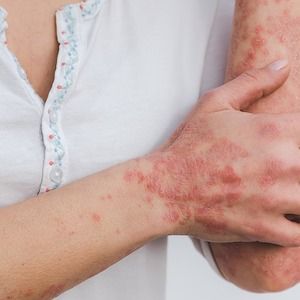Article
Study Suggests Efficacy of Guselkumab in Psoriasis Patients with Inadequate Ustekinumab Response
Author(s):
New research, comparable with that of the NAVIGATE trial, was conducted and showed strong results for the use of guselkumab for psoriasis patients.

In a recent retrospective study, guselkumab was found to be effective for adult patients with moderate-to-severe plaque psoriasis who had inadequate responses to ustekinumab.
The investigators’ research into guselkumab was conducted in order to determine both the efficacy and safety profile of the treatment for plaque psoriasis patients in a real-world setting.
The study was authored by L. Gargiulo, from the IRCCS Humanitas Research Hospital’s Dermatology Unit in Rozzano, MI, Italy.
“Our multicentric retrospective study aimed to assess the effectiveness and safety of guselkumab in 233 patients who received this drug after failing therapy with ustekinumab,” Gargiulo and colleagues wrote.
Research and Methods
The aforementioned NAVIGATE trial previously resulted in data demonstrating guselkumab’s efficacy for patients treated previously with ustekinumab, but the new study was conducted to test for a longer-term, real-world setting.
The research team conducted a multicenter, retrospective study at 14 various hospitals in Italy, recruiting 233 participants with moderate-to-severe psoriasis and given guselkumab following a poor response to ustekinumab.
The participants were recruited between the periods of January 2020 and September 2022.
At baseline, Week 16, Week 52, and Week 104, the researchers assessed both the 233 psoriasis patients’ characteristics and Psoriasis Area and Severity Index (PASI) scores.
Additionally, the team registered the percentages of study participants who had reached 75%, 90%, and 100% PASI improvement, compared with baseline (PASI 75, PASI 90, PASI 100, respectively).
Study Results
The investigators found that after 52 weeks, 89.88% of the study participants achieved PASI 75, 71.43% achieved PASI 90, and 53.83% achieved PASI 100.
A total of 90.48% of psoriasis patients included achieved absolute PASI scores of ≤ 2 by Week 52, the investigators noted.
The team reported that there were higher PASI 75, 90, and 100 rates in these patients compared to those in NAVIGATE, and those participants with involvement of difficult-to-treat regions of the body were found after 16 weeks to be much less likely to reach PASI 90 and PASI 100.
Obesity was also found to be a factor affecting patients’ results, as those who were obese were found after 52 weeks to have substantially lower PASI 75 and PASI ≤ 2 scores.
That being said, responses to guselkumab evened out for every patient regardless of body mass index (BMI) or any other identified subgroup by 104 weeks.
“Guselkumab was well tolerated, as no significant safety findings emerged after two years of therapy,” they wrote. “Larger and longer prospective studies and retrospective analyses of patient databases are needed to further assess the effectiveness and safety of guselkumab in real-life bio-experienced patients.”
The study, “Real-life effectiveness and safety of guselkumab in patients with psoriasis who have an inadequate response to ustekinumab,” was published online in the Journal of the European Academy of Dermatology and Venereology.





